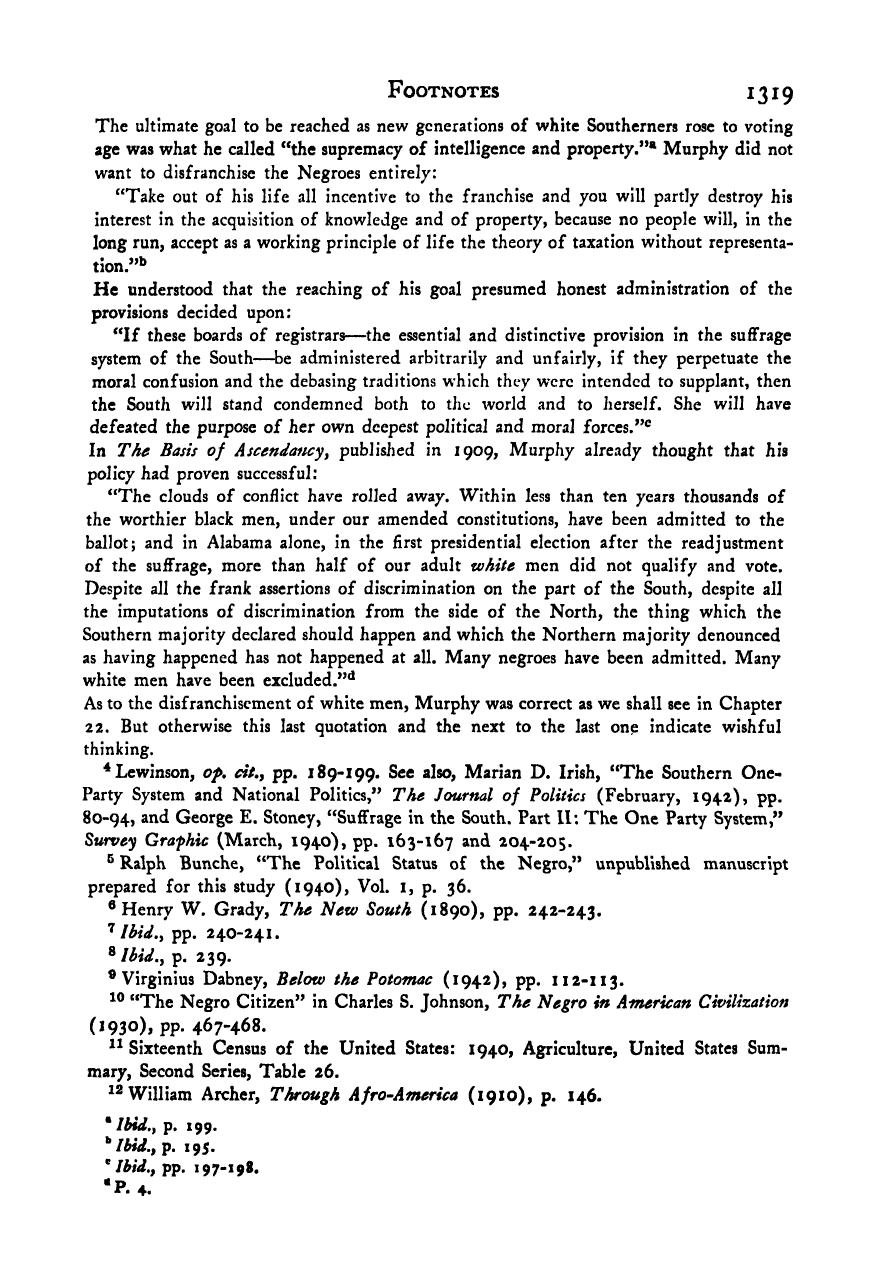Note: Gunnar Myrdal died in 1987, less than 70 years ago. Therefore, this work is protected by copyright, restricting your legal rights to reproduce it. However, you are welcome to view it on screen, as you do now. Read more about copyright.
Full resolution (TIFF) - On this page / på denna sida - Footnotes - Chapter 21

<< prev. page << föreg. sida << >> nästa sida >> next page >>
Below is the raw OCR text
from the above scanned image.
Do you see an error? Proofread the page now!
Här nedan syns maskintolkade texten från faksimilbilden ovan.
Ser du något fel? Korrekturläs sidan nu!
This page has never been proofread. / Denna sida har aldrig korrekturlästs.
Footnotes 1319
The ultimate goal to be reached as new generations of white Southerners rose to voting
age was what he called “the supremacy of intelligence and property.”* Murphy did not
want to disfranchise the Negroes entirely:
“Take out of his life all incentive to the franchise and you will partly destroy his
interest in the acquisition of knowledge and of property, because no people will, in the
long run, accept as a working principle of life the theory of taxation without representa-
tion.”**
He understood that the reaching of his goal presumed honest administration of the
provisions decided upon:
“If these boards of registrars—the essential and distinctive provision in the suffrage
system of the South—^be administered arbitrarily and unfairly, if they perpetuate the
moral confusion and the debasing traditions which they were intended to supplant, then
the South will stand condemned both to the world and to herself. She will have
defeated the purpose of her own deepest political and moral forces.”®
In The Basts of Ascendancy^ published in 1909, Murphy already thought that his
policy had proven successful:
“The clouds of conflict have rolled away. Within less than ten years thousands of
the worthier black men, under our amended constitutions, have been admitted to the
ballot; and in Alabama alone, in the first presidential election after the readjustment
of the suffrage, more than half of our adult white men did not qualify and vote.
Despite all the frank assertions of discrimination on the part of the South, despite all
the imputations of discrimination from the side of the North, the thing which the
Southern majority declared should happen and which the Northern majority denounced
as having happened has not happened at all. Many negroes have been admitted. Many
white men have been excluded.”^
As to the disfranchisement of white men, Murphy was correct as we shall see in Chapter
22. But otherwise this last quotation and the next to the last one indicate wishful
thinking.
^Lewinson, of, cif., pp. 189-199. See also, Marian D. Irish, “The Southern One-
Party System and National Politics,” The Journal of Politics (February, 1942), pp.
80-94, and George E. Stoney, “Suffrage in the South. Part ll; The One Party System,”
Survey Graphic (March, 1940), pp. 163-167 and 204-205.
® Ralph Bunche, “The Political Status of the Negro,” unpublished manuscript
prepared for this study (1940), Vol. i, p. 36.
® Henry W. Grady, The New South (1890), pp. 242-243.
^ Ibid,^ pp. 240-241.
® Ibid,^ p. 239.
® Virginius Dabney, Below the Potomac (1942), pp. 1 12-1 13.
10
«Xhe Negro Citizen” in Charles S. Johnson, The Negro in American Civilization
( J 930), pp. 467-468.
Sixteenth Census of the United States: 1940, Agriculture, United States Sum-
mary, Second Series, Table 26.
William Archer, Through Afro^America (1910), p. 146.
^ Ibid.y p, 199.
^ Ibid.f p. 195.
’
Ibid^f pp. 197-198.
•P. 4.
<< prev. page << föreg. sida << >> nästa sida >> next page >>